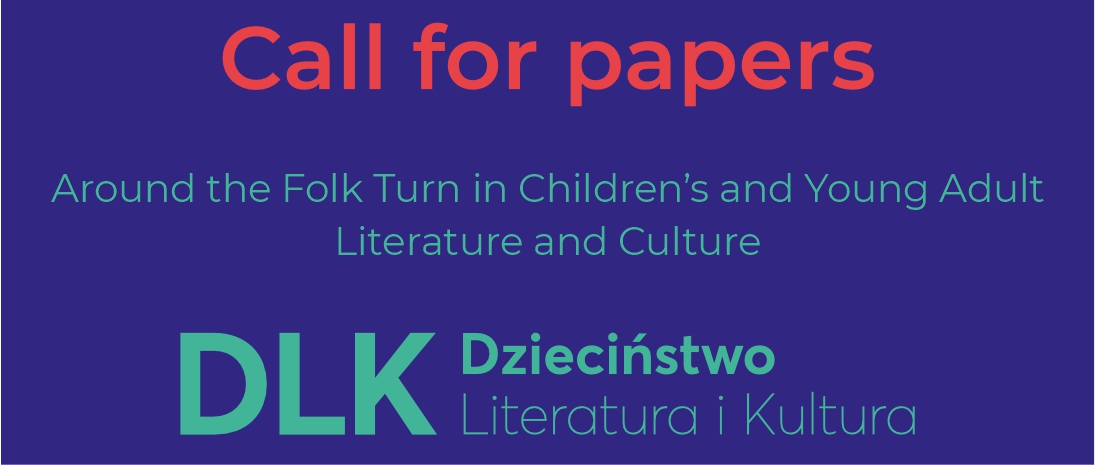The most important subject of the deliberations pursued in the journal concerns constructions of childhood: their transformations (both in previous centuries and recent decades), the directions of this evolution and its dominant tendencies, and the cultural and social causes of changes in the perception and treatment of childhood and adolescence. Analyzes and interpretations presented in “Dzieciństwo. Literatura i Kultura” (“Childhood: Literature and Culture”) focus on visions of childhood in various texts of culture, ones addressed not only to children and young adults, but also to adults: both diverse literary genres and other cultural media (including the complex area of popular culture). (more)
 Creative Commons Attribution 4.0 License
Creative Commons Attribution 4.0 License
CALL FOR PAPERS 1/2025
2024-06-11

Around the Folk Turn in Children’s and Young Adult Literature and Culture
For at least a decade, terms such as ‘folk history’ and ‘folk turn’ have been regularly problematised in the Polish humanities discourse. Katarzyna Chmielewska (2021, p. 307) points out that "[f]olk stories are immersed in a contemporary cultural trend that evokes a lively social response.” Several cultural texts, where traditional culture is the central reference point, can be considered this specific “social response.” These include not only Ludowa historia Polski [Folk History of Poland] (2020) by Adam Leszczyński, Chłopki. Opowieść o naszych babkach [Female Peasants: The Story of Our Grandmothers] (2023) by Joanna Kuciel-Frydryszak, Nieprzezroczyste. Historie polskiej fotografii [Opaque: Stories of Polish Photography] (2023) by Agnieszka Pajączkowska, but also cross-media thematisations of the issue, such as the films Chłopi [Peasants] (2023, dir. DK Welchman and Hugh Welchman), Kos (2023, dir. Paweł Maślona) and the series 1670 (2023, dir. Maciej Buchwald and Konrad Kądziela). (more)
2/2024 — CFP extended
2024-06-03
We have decided to extend the deadline for submissions for the next issue of our journal: "Body and Corporeality – Representations and Discourses in Cultural Texts about Childhood and Adolescence." The new deadline is June 30. You can also submit papers to the "Varia" and "Reviews" sections.
CALL FOR PAPERS 2/2024
2024-01-31

We live in a reality where the body is not only a topic of discussion but also a space of tension. The media message about corporeality is ambivalent. On the one hand, we are flooded with images of fit bodies, filtered faces of influencers, and advertisements featuring models showcasing their youth and attractiveness. On the other hand, a seemingly appreciated body remains a taboo subject. Although mass popular culture is becoming more and more inclusive, we are still reluctant to talk about diseases, disabilities, old age, or complicated relationships with the body - essentially, about all bodies that do not fit into the generally accepted canon of beauty. Social movements such as body positivity and body neutrality are striving to challenge the status quo. (more)
CALL FOR PAPERS 1/2024
2023-08-31

Childhood, adolescence, and technology – exploring the culture of/for Generation Z and Generation Alpha
In our upcoming issue, we would like to address the topic of the relationship between childhood (as well as adolescence) and new technologies in the context of culture of/for young recipients, concerning both the actual status quo and the cultural reconstructions of these relationships (movies, series, video games, music, visual arts, literature, fan fiction, etc.). Describing the so-called Generation Z, Agnieszka Całek argued that these are people born “already in times of widespread access to computers, the Internet, and mobile technologies. [This] generation is the first one that did not need to mechanically learn to use these advancements, but grew up and socialized in the environment of mobile phones, constant access to the network, and social media” (2021, p. 105). Representatives of Generation Z can therefore be described as “digital natives 2.0” (Kosacka, 2020, p. 51). Usually, by preschool age, they already have their first experience with modern technology (Kowaluk-Romanek, 2019, p. 194). The editor of the monograph Dziecko – media – rozwój. O konsekwencjach obecności mediów w życiu dziecka [Child – Media – Development: The Consequences of the Presence of the Media in a Child’s Life] even indicates the fact that “we usually register a child’s first contact with media in fetal life” (Bednarska, 2020, p. 9). (more)
- Arianta. Naukowe i Branżowe Polskie Czasopisma Elektroniczne
- CEEOL (Central and Eastern European Online Library)
- Elektronische Zeitschriftenbibliothek
- Google Scholar
- Scilit
- Sherpa Romeo
- ZDB (Zeitschriftendatenbank)
- ERIH PLUS
- ICI Journals Master List (Index Copernicus)
- Lista czasopism punktowanych Ministerstwa Nauki i Szkolnictwa Wyższego





